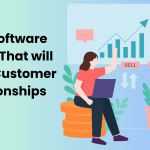Unless you are living under a rock, you must be aware of the ever-evolving landscape of Artificial Intelligence (AI) and its impact on business processes. AI is disrupting across industries and showing us a completely new paradigm shift in gauging success in the digital world.

The potential role of AI in sales is worth-reading as it makes the job easier for sales professionals. The degree to which AI has impacted the sales sector may surprise you. It is an effective tool that can change tactics, increase performance, and raise output. But what really changed the game was how it improved customer satisfaction by offering tailored solutions, cultivating connections with customers, and building trust.
Here, we will delve into the intricate roles of AI in sales, its benefits for sales professionals and the extent of capabilities it can leverage to the sales field.
Let’s get started.
Understanding the Role of AI in Sales
Artificial intelligence and sales enable profit-driven firms to process massive eye-opening data in real-time and use that information to get deeper insights into customer behavior and purchasing patterns. AI-powered tools are leveraged to suggest tailor-made sales strategies to your sales team as per your business needs. All in all, AI enables the incorporation of less human capital leading to a challenge in the highly competitive job market.
Certain cognitive activities, like analyzing body language, gauging voice tonality, and making intricate decisions, are still best left to human brains. However, there is some data that technology can handle far more quickly and efficiently, such as past purchases, email and social media activity, website visits, market trends, and more.
AI’s benefits are far reaching and heading towards fully transformed AI-based sales functions.
Moreover, AI can streamline redundant tasks that are too labor-intensive or data-intensive for humans to perform alone. It incorporates data analysis algorithms to automate repetitive tasks and enhance performance and efficiency of sales operations. However, some sales teams are still reluctant to use AI, and this hesitation could work against them in the future.
How to Use AI-Powered Tools to Optimize Your Sales Operations?
AL tools are versatile and serve different purposes – all leading to help you streamline your sales process based on your business goals and customer needs. Let’s take a die into some of the useful applications of AI in sales.
1: NLP: Transforming Sales Communication & Customer Interactions
Natural language processing (NLP) is a branch of AI that allows machines to receive, understand, interpret and respond in human-like language. NLP in sales is used to analyze customer inputs in the form of text or speech. The machine interprets the input and then delivers a natural output, which feels human-like. This process seems so smooth and natural even though the communication is done between a computer program and a human.

NLP is used by chatbots and AI-powered sales assistants to handle customer interactions. They would understand and respond to the conversations that traditionally needed humans at the back to reply and engage 24/7.
Sentiment analysis is a significant application of this technology that comprehends consumer opinions, inclinations, and pain points. Sales representatives utilize email parsing as an additional example to extract relevant information from emails.
Leveraging NLP-based tools in sales means that your customer engagement and support services will not face halt at any time of the day. Moreover, unlike people, these chatbots and voice-activated sales assistants will not get tired from having to interact with the customer in need.
Here are a few common examples of using AI for sales:
Chatbots:
Businesses are using chatbots to assist website visitors and answer often asked questions. Salespeople won’t have to answer the same questions over and over again thanks to this. Additionally, chatbots can direct users to pertinent articles that have already been published, boosting interaction and guiding leads through your funnel. Chatbots can also be used to set up sales meetings and create leads.
Voice Assistants:
Voice assistants like Alexa (Amazon), Siri (Apple), and Google Assistant, can help you identify mature leads. They analyze phrases related to your product or service, generate tailored responses to close leads and enhance lead generation, lead scoring and lead maturation.
2: AI Analytics: Enhancing Market Positioning and Improve Sales Forecasting
This artificial intelligence tool thoroughly examines your unprocessed data to find and analyze trends. Data analysts can save countless hours of labor by using AI analytics solutions, which can identify anomalies and notify you of them instantly. Now, we’ll take a closer look at the numerous types of AI analytics, as businesses often handle large amounts of data and use it for a variety of purposes.
Sales Forecasts:
Massive volumes of data can be processed by AI algorithms, and insightful information can be extracted. Businesses may now forecast sales with greater accuracy than in the past because of this. AI-powered systems can estimate sales with accuracy by evaluating market trends, consumer behavior, historical data, and a host of other factors. This allows organizations to optimize their sales tactics and allocate resources more efficiently.
Perception of Patterns and Trends:
Trends and patterns in sales data are easily recognised by AI systems. Artificial intelligence (AI) systems are able to find hidden insights that humans might miss by analyzing large datasets. These insights can give firms a competitive edge by highlighting patterns in competitor strategy, market trends, and customer behavior. Equipped with this understanding, sales teams can modify their strategy, pinpoint the ideal customers, and customize their messaging to optimize their prospects of success.
Predictive AI tools leverage AI algorithms to identify mountains of data about sales history and customer buying patterns. Then, these tools build models and graphs to help you in making educated decisions about supply demands and future investments.
3: Smart Process Automation (SPA) & Robotic Process Automation (RPA): Streamlining Workflows
Gone are the days when sales reps used to perform every manual activity. Automation is the need of the hour and SPA and RPA are the right tools for sales process automation. SPA and RPA involve the use of robotics to automate various tasks so that sales professionals can focus on cognition-based and strategic things at work.
SPA discerns when assistance from humans is necessary for it to advance. It incorporates its human equivalents into the process and then makes use of the judgments made by humans to forecast outcomes for situations that may arise in the future. Though SPA isn’t a fully human-free tool, as you’ve seen, it still qualifies as AI because of its machine learning capabilities, which allow it to become more effective over time.
The demands of an ever-evolving digital landscape are automation and streamlining frequent workflows. Organizations can improve overall performance by optimizing procedures through automation. Sensible automation streamlines time-consuming lead and contract processing, making it easier to assign priorities among different tasks. Human mistake is absent from automated procedures, which leads to quicker completion times and higher customer satisfaction.
Intelligent Sales Assistants:
For sales teams, an AI-powered intelligent sales assistant can be a game-changer. These virtual assistants may take care of repetitive duties like data entry, appointment setting, and CRM system updates, freeing up sales representatives to concentrate on developing rapport and closing deals. Furthermore, smart sales assistants can offer recommendations and insights in real-time based on past customer interactions and data, giving salespeople useful knowledge and improving their decision-making.
Final Thoughts
In conclusion, sales are all about managing customer engagement and cultivating lasting customer relationships. These business objectives require some time, resources and savvy know-how. What AI-powered tools and applications do? It offers automation of repetitive tasks, identifying insights based on feasible data, and forecasting valuable outcomes – to optimize your business sales operations.
It not only benefits you in day-to-day sales activities, but also empowers you in taking up insightful and data-driven decisions for your business.
Sales professionals can efficiently partner with powerful AI tools to deliver personalized solutions to their customers that are cost-effective too, without compromising on time and energy.
At Stackup Solutions, we understand the significance of AI for your business. We know that learning to leverage AI-enabled tools for your business growth on your own, can be daunting. Therefore, we are here to help you with our cutting-edge AI services that are simple-to-use and give a boost to your sales in no time.
Moreover, we offer end-to-end AI software development services to help you build customized solutions that match your business needs. So, don’t hesitate to reach out to our team; we’ll be happy to talk about any project you may have in your mind.




.jpeg)